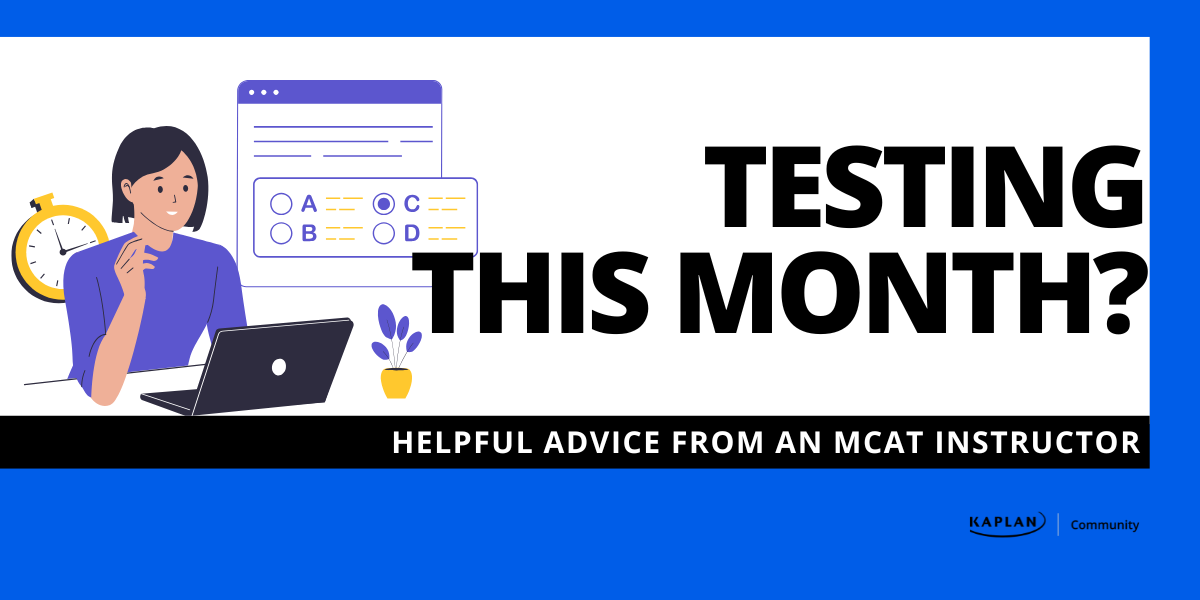Best Of
How do you balance MCAT prep with classes, work, and everything else? [Share your tips]
We know it’s a lot, and there’s no one-size-fits-all answer. Whether you’re juggling a job, research, a full course load, or just trying to stay sane, we’d love to hear what’s actually helping you stay on track right now.
💡 What’s working for you?
📅 A strict schedule?
🎧 Study playlists?
🤝 Accountability buddies?
🍕Built-in break time and rewards?
Drop your best tip (or even your honest struggle) below…we’re all in this together!
What’s your dream law specialty or career path after passing the LSAT?
Law has many directions…corporate, civil rights, IP, immigration, criminal, environmental, sports & entertainment, and more.
What path are you most curious about, and why?
Testing this month? Advice from an MCAT Instructor
If you’re testing soon, you probably have lots of questions, like “What’s the best thing to focus on?” or “How do I know if I’m ready?”, or even “Why did I ever want to put myself through this?!”. Don’t worry, we’re here to help! It’s normal to feel a bit nervous about your test, but having a plan for this last month can make a huge difference, so let’s talk about it and make sure you have some guidelines on what a good plan looks like.
First, DO NOT CRAM. I can’t say this enough. As you get closer to test day, the temptation to cram and frantically try to get more content knowledge “down” goes up, but don’t get drawn in. Cramming does not help you better understand or apply your content knowledge, and can actually make your understanding worse in some cases. Furthermore, it stresses you out and keeps the focus on what you don’t know, rather than encouraging you to lean on what you do know. It is always going to be the case that there is more content that could be covered on the MCAT than you will “know”, and that’s okay! Give yourself credit for the work you’ve already done, and know that the MCAT is more about reasoning and problem solving skills, and less about just “knowing” all the material. There’s no equation or term that you can learn the night before your exam that is going to be more valuable for your test day performance than a good night’s sleep and heading into the test well-rested and confident.
This leads naturally to the second point - get yourself on a good test-day sleep cycle sooner rather than later. If you aren’t used to getting up in time to get to a test center by 7:30am, you don’t want test day to be the first day you attempt that. In an ideal world, you’ll have time to do a few FL practice tests under test day-like conditions (so food/drink only on your breaks, test day timing, starting the test at 8am, etc.), so you’ll be used to it by the time test day rolls around. The more you can practice your test day routine, the more… well… routine it becomes. If at all possible, visit your test center during this last month so you know how long it will take to get there, where to park, how to get into the building, all that kind of stuff. Test day is not the day to find out that actually you have to use a random side-door to get into the center.
You also want to make sure you have your registration in order and your ID is valid. This means double check that your name on your MCAT registration matches your name on your ID, and that your ID is not expired. Your ID needs to be a government issued photo ID - the standard ones are drivers license or passport. If you have any questions about your ID, take it with you when you visit the test center, and verify with them that your ID will work. An expired or otherwise invalid ID is pretty much the only thing that can cause them to turn you away on test day, so make sure that doesn’t happen!
Study-wise, for the last month you want to be focusing your review more on practice tests than on doing content refresher modules and application modules. Again, in an ideal world you want to have a few weeks of what we call the “Prep Cycle” to take a FL practice test, review that test, and then do some studying based on your specific needs. If you are seeing that you’re going to be hard-pressed to finish your content and/or application modules by test day, that’s a good sign that you might need to adjust your test date. As I said above, you don’t want to try to cram over the last month, and especially the last week before test day you should be winding your studying down and focusing more on what you DO know, rather than trying to find “just one more thing” to learn.
As far as judging your readiness for the exam goes, beyond making sure that you’ve completed all the recommended/required work for your Kaplan program (check with your program’s guidelines for what work is required for your guarantee), your best judge is going to be your FL exam scores. The practice test you take a week out from your test day should be predicting your test day performance (within the +/- 2 confidence interval range), so that’s a good benchmark to know what to expect performance-wise. Always remember, too, if you’ve got a Kaplan tutor or teacher(s), we’re here to help you make decisions! Feel free to reach out to us with questions or concerns about your readiness!
Above all else, know that we’ve got your back as you head into the home stretch! Keep up the great work, and we’ll look forward to hearing about your test day success!
 Aaron
Aaron
